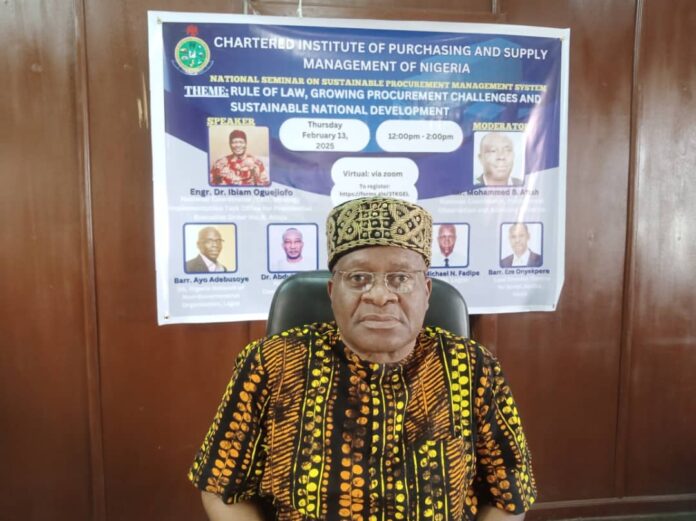Stakeholders at the recent national seminar on sustainable procurement management in Nigeria has identified lack of capacity among many practitioners as responsible for the large scale corruption in the public sector in Nigeria.
The Seminar, organized by the Chartered Institute of Purchasing and Supply Management of Nigeria, CIPSMN in Thursday February 13th had over 250 participants that cut across the three sectors of the economy in the private, public and the nonprofit. The organisers reported a registration number of 520 people but not all could participate due to technical issues.
Hosted on the theme Rule of Law, Growing Procurement Challenges and Sustainable National Development, the Seminar was part of the CIPSMN contribution to the gaps in the management, practice and application of relevant laws on public procurement.
Speaking at the Seminar, the lead paper presenter, Engr. Dr. Ibiam Oguejiofo, a procurement professional, engineer and audit professional, who is currently the National Coordinator and Chief Executive Officer of the Strategy Implementation Task Office for Presidential Executive Order 5 stated that procurement practices and the fight against corruption in Nigeria will only succeed when all stakeholders adhere to the provisions of the laws as contained in the Public Procurement Act, PPA 2007, the CIPSMN Act 2007 and other relevant laws such as the Annual Appropriation Act. These he observed have been grossly misapplied and jettisoned by public officers.
Other speakers who identified capacity gaps include Barr. Eze Onyekpere, the Lead Director, Centre for Social Justice, CSJ, and Dr. Abdul Mamman of CIPSMN North Central Coordinator. In his recommendations, Barr. Onyekpere implored government at all levels, especially the state to engage professionals in the management of procurement system. He argued that until this is done, corruption in procurement will continue to be on the rise due to the activities of quacks.
In similar vein, Dr. Mamman and Barr. Ayo Adebusoye, the Secretary General of Nigeria Network of Non-Governmental Organizations posited that the Federal government need to do more than paying lip service to the fight against corruption without corresponding actions. One of such such action is the political will to constitute the National Council for Public Procurement, NCPP that will create the enabling environment for engagement with professionals in the practice of procurement.
Reactions from other participants centred on the need to reduce Procurement corruption at all levels. In particular, they argued that the recent claim by the Chairman of Economic and Financial Crimes Commission, EFCC to the effect that procurement corruption accounts for about 90% of total corruption in the public sector corroborated the earlier position of the Nigerian civil society organizations, CSOs that claimed 70% of same in 2010.
Participants at the seminar resolved to take this advocacy further by engaging with relevant stakeholders such the legislative and the executive arms of government in addressing these gaps.



